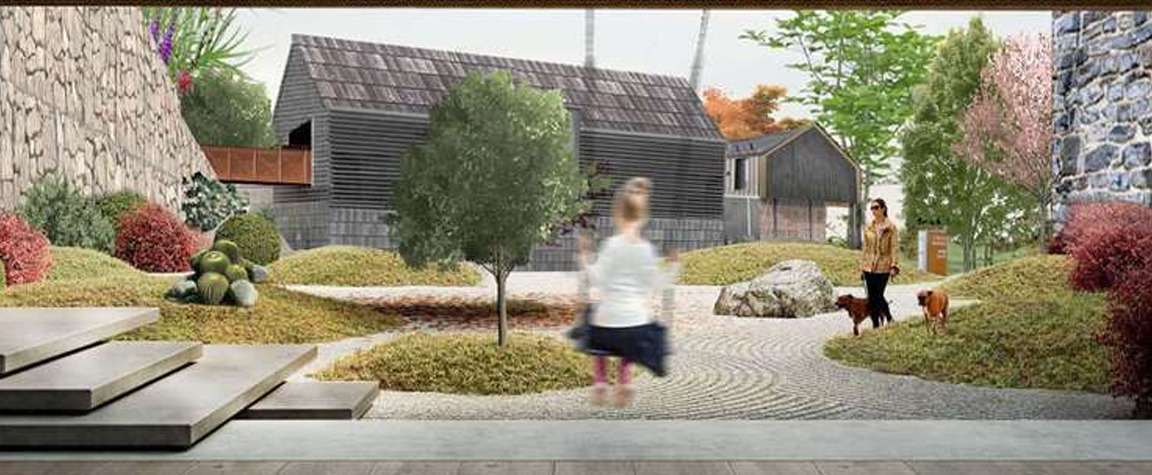Architecture is one of the few subject areas that can be described as an art and a science. This crossover between creative and logical thinking means architecture can be a challenging subject. But those interested in ambitious, interdisciplinary learning can find it an incredibly rewarding area to study at university.
Architecture, Built Environment & Planning degrees require you to think about the function, aesthetics, development and design of buildings and infrastructure. In a world that’s always growing and developing there’s always space for people who design, plan, and build spaces that support everyday life. If you’re interested in designing and creating the future of infrastructure, then this might be a subject to seek out.
Read on to find out some of the benefits of studying architecture, built environment and planning at Northumbria University.
What is Architecture?
Architecture refers to the designing and engineering of large structures and buildings. Architecture is everywhere, from the building you’re in now to supermarkets, hospitals, or offices. Every building has been designed for a purpose, and architecture helps ensure that a building can fit the context it needs in the best way possible. Typically, Architecture courses focus on the technical, cultural, and theoretical elements of the subject.
Those who choose to study architecture in the UK will have enthusiasm for both the sciences and the arts, and architecture admissions requirements typically consider both artistic ability and mathematical skills.
What is Built Environment & Planning?
When you study built environment and planning you’ll get to grips with the other building and design professions as well as develop the skills to tackle planning challenges and requirements. Where architecture might refer more to the individual buildings or collections of buildings and how they’re designed, built environment and planning refers to urban design, including towns, cities, and infrastructure.
Built environment and planning are critical to shaping the spaces that support everyday living. Consider the design of walkways and bike paths, town centre layout, access to transport links, hospitals, and other necessities. These all require an understanding of built environment and planning.
Ready to explore the architecture courses and built environment courses at Northumbria University?
What qualifications and subjects do you need to study Architecture?
Undergraduate Study
Most undergraduate degrees in Architecture, Built Environment & Planning require you to have studied some sort of design-related topic at school, that might be an Art or design A level. Some programmes require you to have studied a Maths or Science subject, though this isn’t always a requirement. Given the nature of this degree it’s likely that you will benefit from studying Maths, Psychology and Science, even if it isn’t a requirement of the degree you choose.
Many Architecture, Built Environment & Planning degrees require you to submit a portfolio along with your application, this would usually showcase your design skills and highlight your interest in the subject.
If you study Architecture, Built Environment & Planning at Northumbria University you’ll need 136 UCAS Tariff points from a combination of acceptable Level 3 qualifications which may include: A-level, T Level, BTEC Diplomas/Extended Diplomas, Scottish and Irish Highers, Access to HE Diplomas, or the International Baccalaureate. Applicants will need Maths and English Language at a minimum grade 4/C, or an equivalent, and a portfolio of creative design work.
If you have a qualification from outside of the UK or have equivalent qualifications please check the guidelines and requirements for your chosen course.
Postgraduate Study
Usually, to study for a Master's in Architecture, Built Environment & Planning degree, you’ll need a strong undergraduate degree in Architecture and a portfolio of your work.
If you study Architecture at Northumbria University minimum of a 2:1 honours degree from a Part 1 accredited Architectural course, and a minimum of three months relevant postgraduate work experience. It’s worth checking the specifics of the Masters in Architecture degree you’re interested in for specific requirements.
If you have a qualification from outside of the UK or have equivalent qualifications please check the guidelines and requirements for your chosen course.
What qualifications do I need to study built environment?
Similar to architecture, when you study built environment, you’ll be required to have studied some sort of design-related topic at school, that might be an Art or design A level. You will benefit from studying Maths, Psychology and Science, even if it isn’t a requirement of the degree you choose. Postgraduate built environment courses will require a strong undergraduate degree in a related subject.
What are the benefits of studying architecture?
Sustainable developments
When you study architecture in the UK or when you study built environment you’ll learn about ways to make existing design and building practices more sustainable. You’ll learn about renewable and stable building materials and ways to ensure that structures don’t impact our environment too harshly. Beyond that you’ll be part of the much needed global context of sustainable practice in the planning and building industry. Future graduates of this subject are crucial to bringing new perspectives to climate change challenges and developments.
Creative pursuits
Architecture is an incredibly creative subject that needs expression, vision and follow through. Not only will your creativity shine in architectural drawings, concept designs and model building but thinking creatively and approaching problems and challenges with imagination and curiosity is a skill you’ll develop on architecture courses.
Beauty in science and in art
The crossover between science and art in architecture is sometimes overlooked, surely when designing buildings the priority needs to be functionality, rather than aesthetics? But, those who study architecture or study built environment and planning will learn about the importance of how buildings make people feel and the impact this can have on function and practice.
A satisfying career, in demand
Being able to see something you’ve carefully designed, crafted and modelled take shape as a real life building or city plan is incredibly rewarding. The architectural, built environment and planning field is an increasingly dynamic sector with change and development advancing and developing rapidly. As a result of this continued surge in growth you’ll find that architects and qualified building environment and planning graduates are in high demand.
Making an impact
As you study architecture, built environment and planning you’ll be learning how to create a future. Your work will touch many people's lives, from those who interact with the buildings and infrastructures you design, to those simply existing around it. Your work could be transformational for how people interact with a space, task or a space. That’s something to be proud of.
What course options are there to study architecture, built environment and planning?
Types of degree
There are many different ways to study architecture, built environment and planning. Common options for degree focus include:
- Architecture
- Building
- Landscape and garden design
- Planning (urban, rural, and regional)
Because of the vocational element of many architecture degrees and built environment and planning degrees, there are strong links to industry. Degrees often include placements and field trips alongside traditional lectures. Many architecture courses also offer professional accreditation, accreditation is an asset for employability because it ensures that your studies have been regulated in accordance with current practical regulations.
Depending on the course content most architecture, built environment and planning degrees lead to qualifications like BA, BSc, BArch and MEng and MArch degrees.
Architecture
When you study an architecture degree in the UK you’re usually required to study for at least seven years, broken into three phases. Your studies will span everything from drawing and modelling to the mathematical, analytical and computer skills you’ll need and a deep understanding of materials. You’ll complete 5 years of university study and 2 years of practical experience as a minimum, there are lots of options to do this full-time or part-time if you’d prefer.
Planning
When you study planning at university you’ll learn about the development and design of land use and the built environment. Spanning everything from airspace and water to infrastructure, your course will give you a robust understanding of the political, environmental, economic, cultural and social elements involved in urban planning, so you are prepared to help address the challenges of rising population growth around the world.
Built environment
Built environment courses tend to cover the main aspects of the construction process itself, such as materials, techniques and economics, as well as quantity surveying and property development. With construction being such an important industry in many countries worldwide, it can pave the way to an excellent career, especially with postgraduate qualifications such as MSc Building Design Management, MSc Asset Management & Development or PhD Building Technology.
RIBA accreditation
Many architecture courses in the UK are accredited by RIBA - The Royal Institute of British Architects. Accreditation is important for ensuring that your employability when you graduate is strong.
Studying abroad
Because of the demanding nature of architecture courses and built environment courses students may be put off by the idea of studying abroad. However, as with many other subjects the benefit of studying abroad can be extremely beneficial for this diverse, global sector. Consider the design styles of cities and buildings across the world. Knowing how cultural context influences design and practice in architecture, built environment and planning is critical for designing inclusive and meaningful infrastructure for everyone.
What career prospects does architecture offer?
When you study architecture, you’re becoming part of a growing and demanding field, which means there is plenty of work to be done and career prospects are very good with many graduates going straight into employment or further study. The field is competitive, but a solid degree result paired with industry-relevant work experience will give you a good chance of success.
Graduate destinations include:
- Professional, scientific, and technical
- Construction
- Real estate
- Wholesale and retail trade
- Public administration and defence industries
What jobs can you get with an architecture degree?
The vocational element of architecture courses and built environment courses mean that graduates tend to progress into practical applications of the subject. There are plenty of opportunities for further study and specialist career progression including:
- Sustainable building practices
- Building materials
- Urban planning
- Architectural technology
- Interior design
- Landscape architecture
Not all those on architecture courses or built environment courses continue into that particular field as an architect or similar profession. Your skills could lead you into a related career:
- Building surveyor
- Conservation architect
- Interior designer
- Lecturer
- Lighting designer
- Production designer for TV, film or theatre
- Structural engineer
- Teacher
- Urban designer
Why choose Northumbria University for Architecture, Built Environment and Planning?
The thing that sets architecture and built environment at Northumbria University apart from other universities is the strong industry links that the department and academics have. This means you’ll work on live and authentic projects across a diverse range of sites. Employability is at the core of all architecture and built environment courses at Northumbria University. This course is designed to give you the full range of skills you’ll need for a career in architecture or related fields.
Architecture courses at Northumbria start by covering the core themes of design delivering a strong foundation for you to develop knowledge and expertise. You’ll have the opportunity to travel abroad on field trips to experience architectural practice in a different historical and cultural context and you’ll take part in project-based learning, completing independent and group projects to develop a personal approach to architectural design.
Get to know more about architecture and built environment courses at Northumbria University.
Facilities
When you study architecture or built environment courses at Northumbria University you’ll have access to industry-standard technical resources, from software to laboratories and studios. Whatever your aspirations in architecture and built environment, you’ll find the latest technologies to support you.
Discover more of what Northumbria University can offer you.
Reputation
League table positions can’t tell you everything about architecture courses or built environment courses but it’s a good place to start. We’re proud of our rankings and work to improve our scores year after year.
Research Excellence
At Northumbria, the architecture and built environment department has been ranked 11th in the UK for research power in the 2021 Research Excellence Framework, with three-quarters of research relating to architecture, built environment and planning rated as being world-leading or internationally excellent.
Academics working within architecture and built environment at Northumbria University are key founders of the Times Higher Education (2017) “most innovative Business-University collaboration” award-winning BIM Academy Enterprises (Ltd), a unique joint venture with Ryder Architecture Ltd for construction digital services with commissions in the UK and Europe, Middle East, Far East and Australasia. Its high-profile projects include the Sydney Opera House and the M+ Museum in Kowloon, Hong Kong.
Find out more about the world-leading research our academics are working on.
FAQs
What topics does an Architecture degree cover?
This predominantly depends on the degree you’re studying. The subject matter will be different if you study built environment or architecture and whether you’re studying for an undergraduate or Masters’ in architecture degree. However, common topics include:
- Architectural design and communication
- Technology and environment
- Environmental science for architects
- People, buildings, landscape
- Practice and management
- Buildable, habitable design
- History and theory of architecture and design
- Design process and communication
- Sustainable design
It’s likely you’ll cover the key themes of architectural design in whatever architecture course you do. They include:
- Communications
- History and theory
- Technology and environment
- Practice management and law
What do I include in my portfolio?
The goal of having a portfolio as part of your application stage is to give you space to show off your skills and passion for architecture. Include your best academic projects and present them in an orderly creative way that speaks to your interests and reasons behind them.
Why study architecture in the UK?
When you study architecture in the UK you’re joining a world-leading field. The UK is home to two out of the top 10 universities for architecture in the world according to the QS world rankings. Architecture in the UK has pioneered global architectural practices that have shaped our present and future. For example, when you study architecture in the UK you’re joining global influencers on topics like low-carbon and sustainable architectural design, and ecologically considerate, energy-efficient buildings.
Please Note
All content is accurate as of the time of writing, the information in this guide is subject to change and will be updated as required to reflect this.
















